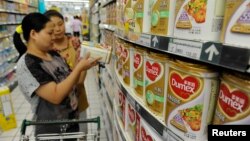BANGKOK —
New Zealand dairy giant Fonterra is apologizing after milk powder used in products exported to China and other countries in Asia was found to contain bacteria that could cause botulism.
The head of the milk powder exporter, chief executive Theo Spierings made the apology Monday after China suspended imports of its products after the possible contamination was revealed.
Fonterra, the world's largest dairy exporter, found bacteria in some of its products that may lead to botulism, a serious paralytic illness that can be fatal. The company has issued a recall across Asia.
Almost 90 percent of China's $1.9 billion in milk powder imports came from New Zealand in 2012. Chinese consumers already purchase much of their infant formula from foreign manufacturers because of fears of contamination in domestically produced milk.
Spierings spoke to reporters Monday in Beijing.
"In this situation we apologize, we deeply apologize to the people who have been affected by the issue to guarantee to you that food safety and the safety of the people of the [People's] Republic of China and also around the world is our first and foremost interest," he said.
Spierings also said no products tested and sold in China showed any contamination and the company had not received any reports of health issues or consumer complaints about the tainted batches.
There are no reports so far of anyone falling ill from the contamination.
That did not appease New Zealand Prime Minister John Key, who suggested the company should have taken more precautions after discovering bacteria in earlier testing.
The contaminated whey protein concentrate had been exported to several other markets, including Malaysia, Thailand, Vietnam and Saudi Arabia. The powder was used in products including infant milk powder and sports drinks. Russia has temporarily suspended purchases of all New Zealand dairy products.
A World Health Organization senior official, Howard Sobel, said the scare highlights WHO concerns over infant formula and the potential threat of poisoning.
"What we can say is that powder infant formula is not a sterile product," Sobel said. "It's even made to the best of manufacturing at the base line you will find lots of different bacteria in there. Botulism is basically a relatively rare one to find in it but we find that and many other bacteria and other contaminants in formula."
The WHO promotes breast feeding over the use of formula because breast milk provides children with key antibodies and better nutrition. According to the WHO, more than 220,000 children die each year from poor hygiene and food contamination.
The latest health scare comes five years after a Chinese dairy company was found to be adding melamine, a chemical used in plastics, to boost infant formulas. More than six children died from poisoning, and hundreds fell ill.
The scandal led to a sharp increase in demand for foreign-made infant formula, causing shortages in some places.
The head of the milk powder exporter, chief executive Theo Spierings made the apology Monday after China suspended imports of its products after the possible contamination was revealed.
Fonterra, the world's largest dairy exporter, found bacteria in some of its products that may lead to botulism, a serious paralytic illness that can be fatal. The company has issued a recall across Asia.
Almost 90 percent of China's $1.9 billion in milk powder imports came from New Zealand in 2012. Chinese consumers already purchase much of their infant formula from foreign manufacturers because of fears of contamination in domestically produced milk.
Spierings spoke to reporters Monday in Beijing.
"In this situation we apologize, we deeply apologize to the people who have been affected by the issue to guarantee to you that food safety and the safety of the people of the [People's] Republic of China and also around the world is our first and foremost interest," he said.
Spierings also said no products tested and sold in China showed any contamination and the company had not received any reports of health issues or consumer complaints about the tainted batches.
There are no reports so far of anyone falling ill from the contamination.
That did not appease New Zealand Prime Minister John Key, who suggested the company should have taken more precautions after discovering bacteria in earlier testing.
The contaminated whey protein concentrate had been exported to several other markets, including Malaysia, Thailand, Vietnam and Saudi Arabia. The powder was used in products including infant milk powder and sports drinks. Russia has temporarily suspended purchases of all New Zealand dairy products.
A World Health Organization senior official, Howard Sobel, said the scare highlights WHO concerns over infant formula and the potential threat of poisoning.
"What we can say is that powder infant formula is not a sterile product," Sobel said. "It's even made to the best of manufacturing at the base line you will find lots of different bacteria in there. Botulism is basically a relatively rare one to find in it but we find that and many other bacteria and other contaminants in formula."
The WHO promotes breast feeding over the use of formula because breast milk provides children with key antibodies and better nutrition. According to the WHO, more than 220,000 children die each year from poor hygiene and food contamination.
The latest health scare comes five years after a Chinese dairy company was found to be adding melamine, a chemical used in plastics, to boost infant formulas. More than six children died from poisoning, and hundreds fell ill.
The scandal led to a sharp increase in demand for foreign-made infant formula, causing shortages in some places.










